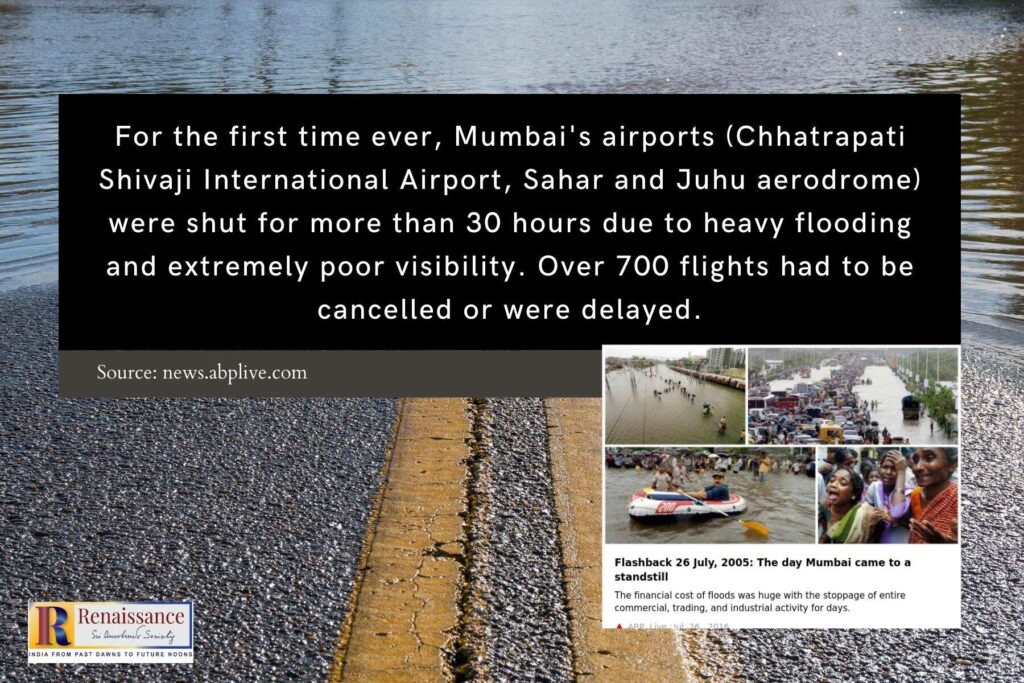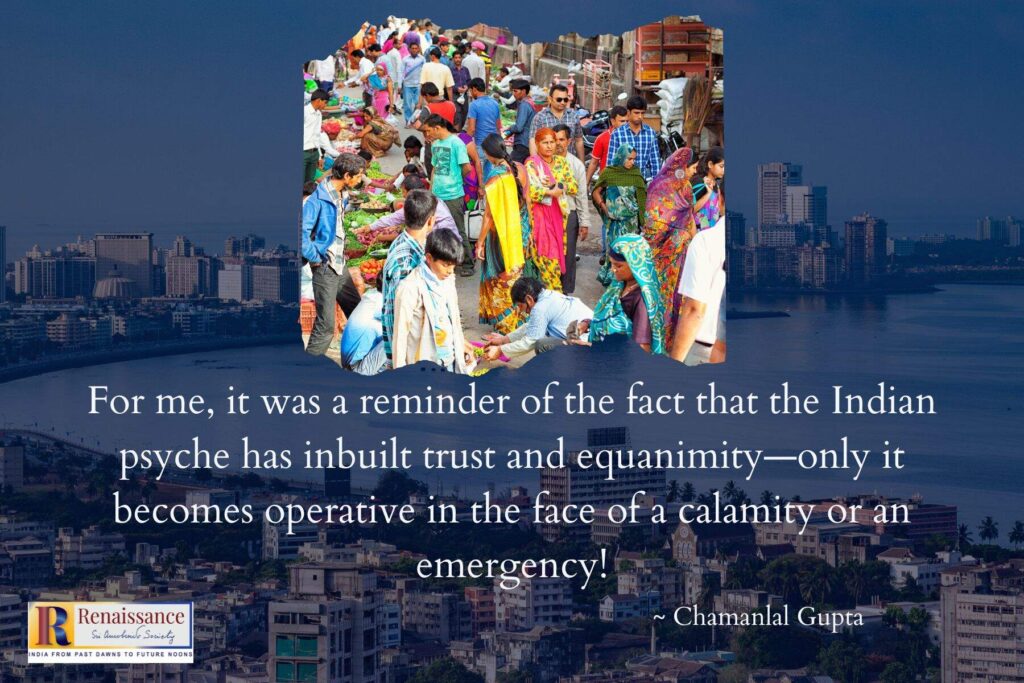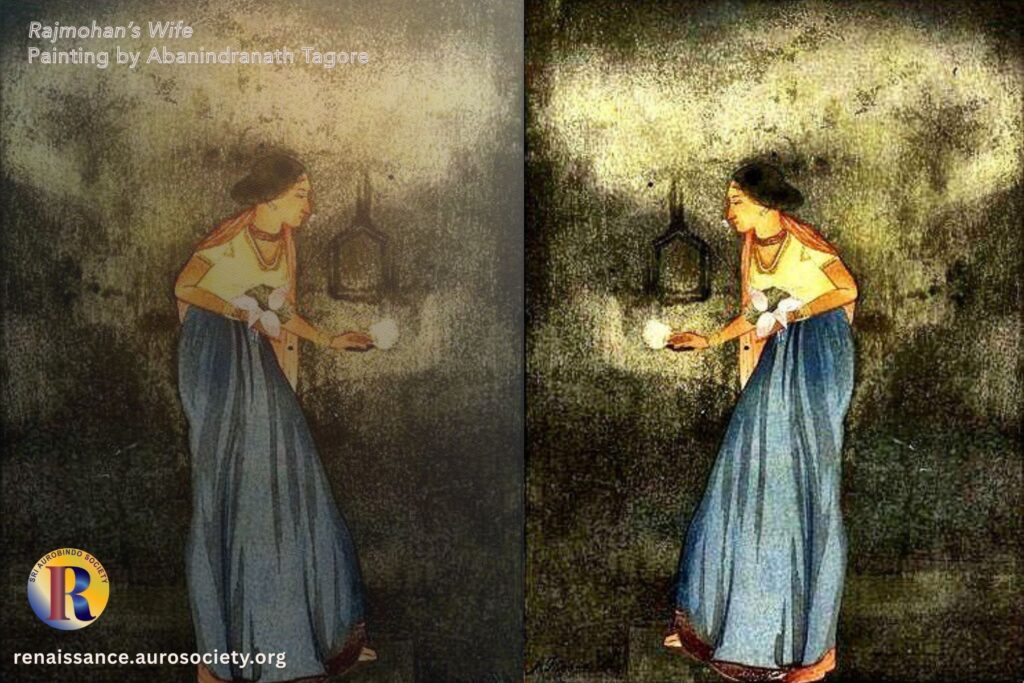Vol. III, Issue 7
Author: Chamanlal Gupta
Editor’s note: A senior member of Sri Aurobindo Ashram recounts the time when he was trapped for thirty hours under a leaking hangar at Mumbai airport in July 2005. This was first published in Sri Aurobindo Ashram’s journal ‘Mother India: Monthly Review of Culture‘ Vol. LVIII No. 11, pp. 1076-1077. We have made a few minor formatting revisions without changing the text.

By a most unlikely coincidence, I happened to be in Mumbai during the recent deluge (July 26-28th, 2005), trapped for thirty hours under a leaking hangar at the airport.
The swanky new terminal was to be inaugurated on July 28th by the Prime Minister. It was a sunny morning on 26th, got a bit wet by 12 noon when it started to rain incessantly. After helping out with a student’s Ph.D. thesis,—which was a victory over circumstances,—at the heat pump laboratory of IIT, I was deposited at the JET terminal by 2 p.m.—sans lunch.
Later, this student had to stay in the bus for 18 hours, stranded by floods on the road and wade through for 4 hours to reach Andheri from Powai, albeit safely. But the roads were not flooded till 2.30 p.m.
We were duly checked in and security-cleared for take-off at 3 p.m. Then the heavy deluge began and the floors of the departure lounge started getting water. Everyone was silently curious, playfully taking off their shoes to avoid skidding. By 7 p.m. the runways were flooded, the ceilings were leaking and flights started getting cancelled!

Hopes were still high except for some anxiety, but the truth sank in when the power went off. Except for captive power for the lighting, the other units failed—the air conditioning and computers went dead, booking counters got flooded and tickets had to be hand cancelled by 10 p.m. as well as returning of baggage to those who did not want to wait.
How this miracle was achieved by a harried airline staff (most of them were ladies in their mid-twenties) is a story by itself. Since it was becoming stuffy inside the terminal, I preferred to go to the outside hangar-like hall and was lucky enough to get a chair. Fortunately, the toilets were functional and drinking water was available.
The inner strength became evident now.
People accepted the hard reality without any unnecessary or overt reaction. Except for the security and airlines staff, practically everyone fell asleep—on chairs, on luggage trolleys, on luggage checking counters, on wet floors with newspapers serving as bedsheets. In fact some were even snoring.
I said to myself that if my countrymen could sleep so well in the middle of this mess then they must surely be at peace! People in slums do it all the time but slum dwellers don’t frequent airports! No complaints, no quarrels.
Personally I had asked Mother to help me to remain calm and not to react under any circumstances. She granted my prayer. So there was a great lesson for me in this entire episode.
The worst-hit passengers were the IT boys and girls who had only their briefcases with laptops, and they were shivering in their wet clothes. Many of the wet clothes had to be discarded and some of the smart kids had to be in their inner wear, wrapped in towels and lungis given by others. This was necessary to avoid getting pneumonia and they accepted the gifts most graciously.
Some overseas guests were heard muttering in the beginning while the rain outside came battering down. Soon they too stopped and tried to make do, but they did not sleep. There was practically nothing for dinner as the small snack shops had run out of everything, even biscuits. We still did not know that the roads outside were flooded because telephones and cell phones went dead by 9 p.m. and there was no way to know what the condition outside was. It was truly a rehearsal for a 21st century post-modern fiasco.
In any adverse circumstances, people tend to open up and share.
Spontaneously, some shared their food and even the few cell phones as long as they worked! In our small group a lady scientist from Nigeria, who had come to sign a MOU with the Neem Foundation in India in Mumbai, fell in a gutter and was badly hurt. We tried to help her in our small ways. Instantly, all barriers broke and we became friends and shared thoughts and experiences. She was deeply touched by the Indian capacity to bear a crisis like this so patiently.
By 5 a.m. on 27th July the new life cycle began. Some breakfast could be had at the workers’ canteen outdoors but one had to get wet and wade through to get there. Some cell phones started working, and these were freely shared to be able to inform one’s kith and kin. By lunchtime, the airlines staff put their act together. Lunch was served to passengers as well as staff in the airport restaurant upstairs. From there one could see that the runway was still under water and probably damaged.
With 5000 people being kept in suspense by the airlines staff, the passengers began to badger them rather harshly. Their fault was that they had kept the passengers dangling, instead of telling them clearly that planes could not fly under such weather conditions and that the runway was not safe. They went on saying that things would return to normal, first, by 12 noon, then by 4 p.m. Finally they said that the planes would not be able to take off on 27th as well. After this announcement things were much quieter.
Since by now, one back road was open, I chose to go back for the night to IIT. Luckily a taxi came our way. Along with three IT kids we drove back. And one of them went to his office (still under water) after this ordeal — and we Indians are not known to be conscientious!

Around noon the next day, the weather started clearing up and passengers helped the airlines staff to get all passengers of 26th, 27th and 28th organised. All tickets had to be reissued and made by hand as the computers were still down. A young duty supervisor at JET Airways earned everyone’s admiration by her efficient and deft handling of the situation.
We were airborne by 8 p.m. on 28th July. There was a long queue of aircrafts on the runway, like cars on a busy road during a traffic jam! Since most of the stranded passengers had rested, nobody was complaining as is our usual habit. Some of us met again in the boarding hall and it was such a joy after sharing the ordeal together.
For me, it was a reminder of the fact that the Indian psyche has inbuilt trust and equanimity—only it becomes operative in the face of a calamity or an emergency!

~ Design: Beloo Mehra and Biswajita Mohapatra



